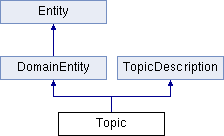Topic is the basic description of data to be published or subscribed. A topic is identified by a name and a type. A Topic is created by calling DomainParticipant.create_topic(). Prior to creating a Topic, the associated data type must be registered with the DomainParticipant via a call to the TypeSupportXYZ.register_type() function. [The register_type() function is auto-generated 'type-specific' code.]. More...

Public Member Functions | |
| ReturnCode_t | enable () |
| DomainParticipant | get_participant () |
| This operation returns the parent DomainParticipant of the Topic. | |
| String | get_type_name () |
| This operation returns type_name of the Topic. | |
| String | get_name () |
| This operation returns topic_name of the Topic. | |
| ReturnCode_t | set_qos (TopicQos qos) |
| ReturnCode_t | get_qos (TopicQos qos) |
| ReturnCode_t | set_listener (TopicListener new_listener, long mask) |
| TopicListener | get_listener () |
| ReturnCode_t | get_inconsistent_topic_status (InconsistentTopicStatus status) |
 Public Member Functions inherited from Entity Public Member Functions inherited from Entity | |
| StatusCondition | get_statuscondition () |
| int | get_status_changes () |
| ReturnCode_t | enable () |
| InstanceHandle_t | get_instance_handle () |
Topic is the basic description of data to be published or subscribed. A topic is identified by a name and a type. A Topic is created by calling DomainParticipant.create_topic(). Prior to creating a Topic, the associated data type must be registered with the DomainParticipant via a call to the TypeSupportXYZ.register_type() function. [The register_type() function is auto-generated 'type-specific' code.].
| ReturnCode_t enable | ( | ) |
Enables the Topic. A Topic is created either enabled or not based on the DomainParticipantQos setting entity_factory. When a Topic is not enabled, only the following sub-set of all Topic operations are legal:
Any other operation may return the ReturnCode_t.RETURNCODE_NOT_ENABLED error. Topic.enable() may be called on an already enabled Topic [it will have no effect].
| ReturnCode_t get_inconsistent_topic_status | ( | InconsistentTopicStatus | status | ) |
Provides access to the InconsistentTopicStatus of the Topic. As a side-effect, this routine will reset the total_count_change status field to zero.
| TopicListener get_listener | ( | ) |
This operation returns the currently installed TopicListener.
| ReturnCode_t get_qos | ( | TopicQos | qos | ) |
| ReturnCode_t set_listener | ( | TopicListener | new_listener, |
| long | mask | ||
| ) |
Installs a TopicListener on Topic t. Only one listener may be attached to a Topic at a time. A call to set_listener() will replace any current listener with a_listener.
a_listener can be NULL, which indicates a listener that does nothing.
The infrastructure will make an internal copy of the listener structure so that it need not be persisted by the application.
| ReturnCode_t set_qos | ( | TopicQos | qos | ) |